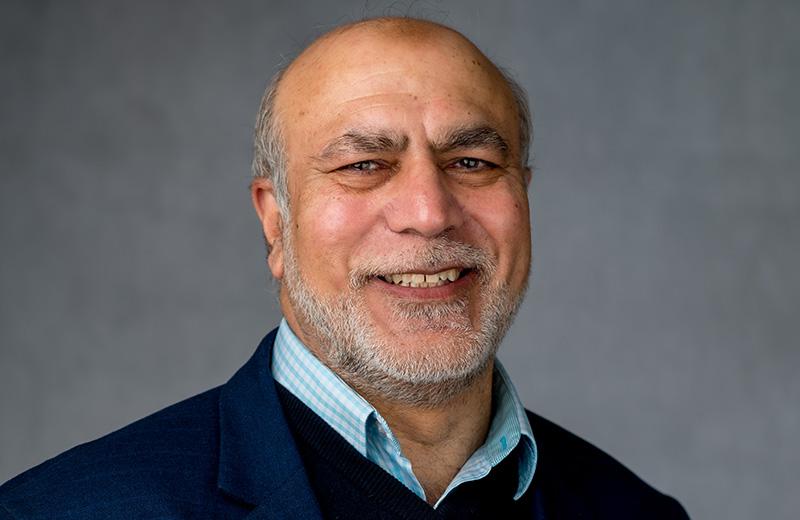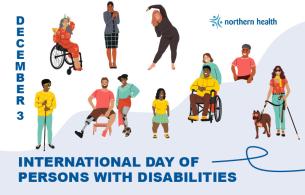Dr. Jamil Akhtar trained as a physician and anesthesiologist in South Africa and has also worked in Australia. His journey in life ultimately brought him to Prince George, the place he has now called home for more than a decade.
When Dr. Akhtar and his family first considered moving to Canada to be closer to family, Prince George was not on his radar. However, a family trip to Whistler, Vancouver Island, and Northern BC soon brought BC to the top of the list, resulting in the family’s move to Prince George in 2009.
Adapting in a pandemic
In the early months of the COVID-19 pandemic, when the possibility of personal protective equipment (PPE) shortages was very real, an aerosol intubation box created by Dr. Hsien Yung Lai of Taiwan piqued Dr. Akhtar’s curiosity. It was something he thought could be useful at the University Hospital of Northern BC (UHNBC) in Prince George.
It’s a Plexiglas box that can be placed over a patient’s head and shoulders to protect both patient and doctor during intubation. Unlike single-use PPE (such as masks and gloves), the intubation box can be sanitized and re-used many times. With help from the Spirit of the North, Dr. Akhtar was able to design his own intubation box, which was then built by a local vendor and evaluated by the intensive care unit (ICU) and other UHNBC departments. The creation of the box was also supported by the physician quality improvement (PQI) program at Northern Health.
“The PQI team is dedicated to providing quality improvement education, coaching, and support to physicians and their teams across the Northern Health region,” says Dr. Akhtar.
Another project Dr. Akhtar is working on is to decrease surgery wait times at UHNBC. He hopes to shorten the interval between when the hospital receives referrals and when it books the resulting surgeries. As stated on Northern Health’s PQI website, the goal is to reduce wait times from the current 38.5 days to seven days. One of the ways Dr. Akhtar hopes to do this is to shrink waitlists by reducing last-minute appointment cancelations. For now, the project focusses on the gynecology and urology departments. It’s a project in the works that he hopes to dedicate more time to in the future.
Improving quality, one project at a time
Dr. Akhtar has always had an interest in quality improvement. However, it was a leadership course at Harvard University in 2017 that reignited this spark. After the course, he returned to Prince George with fresh enthusiasm for improving health care in the North.
At that time, the Northern Health quality improvement program was still very new. In addition to what he’d learned at Harvard, Dr. Akhtar was keen to share the insights he’d gained during his years of practice. He began by giving a presentation about team-building to interested Northern physicians. That presentation and the discussion that followed helped build the foundation of the Northern Health PQI program. Dr. Akhtar soon became a PQI coach, allowing him to work with other doctors and medical staff to explore and develop ideas for quality improvement.
Doctors interested in the Northern Health PQI program can attend a variety of PQI courses, taking basic training and progressing to advanced PQI education. (For more information, please visit the Northern Health PQI education and workshops website).
Once in the PQI program, doctors have access to PQI coaches such as Dr. Akhtar, who can mentor them as they navigate their projects of interest. Other medical staff (such as nurses) can also access Northern Health PQI for information about their own projects. As well, medical students have access to some PQI information and support.
Likewise, students in the Northern Medical Program (a UBC Medical Program cohort at UNBC) host a chapter of Institute for Healthcare Improvement (IHI) and can attend presentations and discussions with PQI professionals, including Dr. Akhtar.
When Dr. Akhtar joined, the PQI program was not as large or far-reaching as those in other BC health authorities. However, Dr. Akhtar says he sees more interest in PQI now. Doctors are seeing areas that they'd like to improve, and realizing they can get more involved with programs like PQI, and with the education and support that comes with them.
“Physicians are busy in their work, in their practices,” he says. “It’s good that we are seeing a revival in the interest.”
Defining success
Some keys to the success of Northern Health's PQI program, according to Dr. Akhtar, are “teamwork and excellent leadership; becoming involved with other health authorities running quality improvement; and bringing in their own thoughts, a steering committee, and quite a bit in terms of planning."
Dr. Akhtar and the PQI team are excited to continue to work to improve the program, spread it throughout the North, and continue the PQI program goal of enhancing the delivery of quality patient care.
To see completed and ongoing PQI projects across the North, visit the PQI project map.














Comments